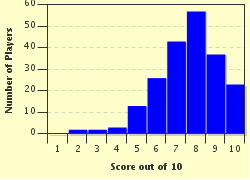Quiz Answer Key and Fun Facts
1. How did Socrates die?
2. Who was Marcel Proust?
3. What was another term for Russia's Bloody Sunday?
4. In what state of the U.S. was the nuclear power station known as Three Mile Island located?
5. From whom did America get its name?
6. To what does Napoleon's "100 Days" refer?
7. What month was Julius Caesar assassinated?
8. What was the first U.S. broadcasting network?
9. Who signed the Magna Carta into law in 1215?
10. Ambroise Paré was the father of modern _______.
Source: Author
pennie1478
This quiz was reviewed by FunTrivia editor
bloomsby before going online.
Any errors found in FunTrivia content are routinely corrected through our feedback system.


